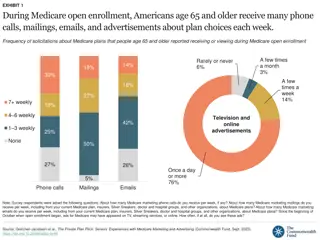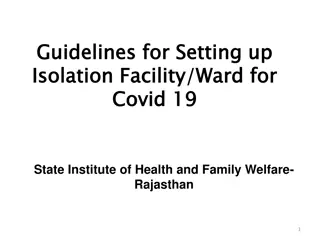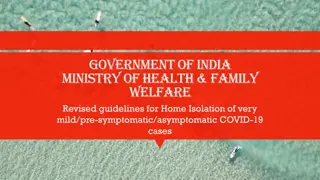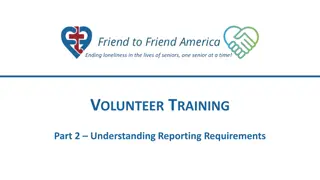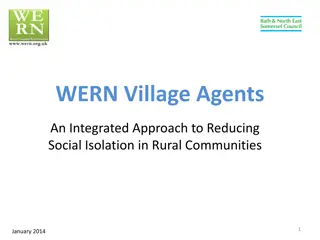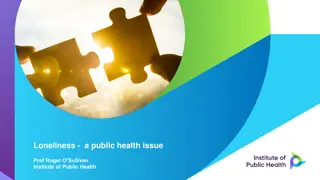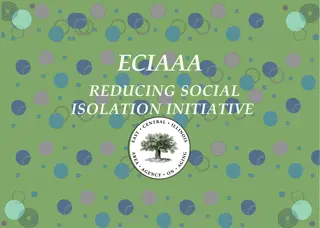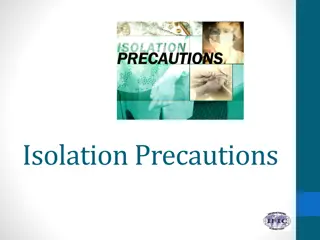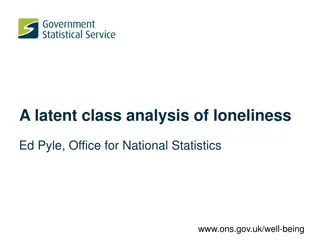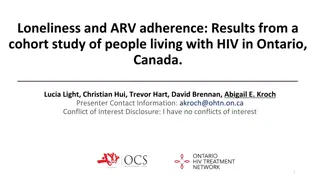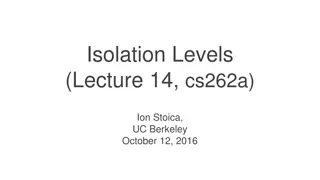Understanding Social Isolation and Loneliness in Seniors
Social isolation and loneliness pose significant risks to seniors, increasing the likelihood of mortality, impacting both physical and mental health, contributing to cognitive decline, and raising vulnerability to elder abuse. Factors such as loss of spouse, lack of social contacts, transportation difficulties, and health issues can exacerbate these challenges. Addressing senior isolation is crucial for promoting overall well-being and quality of life.
Download Presentation

Please find below an Image/Link to download the presentation.
The content on the website is provided AS IS for your information and personal use only. It may not be sold, licensed, or shared on other websites without obtaining consent from the author. Download presentation by click this link. If you encounter any issues during the download, it is possible that the publisher has removed the file from their server.
E N D
Presentation Transcript
Social Isolation/loneliness The most terrible poverty is loneliness, and the feeling of being unloved. Mother Teresa
Social Isolation /loneliness Alan P. Siegal M.D Geriatric and Adult Psychiatry LLC 60 Washington Ave Hamden, CT 06518 203-288-0414
Social Isolation/loneliness Social isolation is defined as "a state in which the individual lacks a sense of belonging socially, lacks engagement with others, has a minimal number of social contacts and they are deficient in fulfilling and quality relationships"
Social isolation Social isolation is as likely to reduce life expectancy as smoking and high blood pressure. Connection can literally save our lives. --Pantellet al, Am J Pub Hlth 2013
Social isolation /loneliness Loss of spouse, friends Family far, uninvolved Health issues Mobility and transportation difficulties Quarantine do to Covid
Social Isolation /loneliness Senior isolation increases the risk of mortality Feelings of loneliness can negatively affect both physical and mental health Perceived loneliness contributes to cognitive decline and risk of dementia Social isolation makes seniors more vulnerable to elder abuse.
Social Isolation/loneliness Social isolation in seniors is linked to long- term illness Loneliness in seniors is a major risk factor for depression Socially isolated seniors are more pessimistic about the future Physical and geographic isolation often leads to social isolation.
Social Isolation /loneliness Loss of a spouse is a major risk factor for loneliness and isolation Transportation challenges can lead to social isolation Caregivers of the elderly are also at risk for social isolation Loneliness can be contagious
Social isolation /loneliness Loneliness causes high blood pressure Isolated seniors are more likely to need long-term care Lonely people are more likely to engage in unhealthy behavior
Social isolation /loneliness Depression Dementia Falls Hospital re-admissions Mortality
Social isolation /loneliness Volunteering can reduce social isolation and loneliness in seniors Technology can help senior isolation Physical activity reduces senior isolation Finding purpose reduces isolation
Interventions work! educational and social activity group interventions that target specific groups can alleviate social isolation and loneliness among older people. --Cattan et al, Ageing and Society 2005
Socialization Senior Centers Adult Day Care Centers Libraries Churches and synagogues Town schools Community Service Organizations Assisted Living Facilities
Technology Skype Smart phones Internet access Classes on line
Nutrition Poor nutrition common Many causes Contributes to falls, general ill health, depression
Health, wellness and safety Regular doctor visits/remote Exercise Take medications as prescribed Eat balanced meals Phone support network
Health, wellness and safety Telephone trees Intergenerational connections Boy and Girl scouts Nutritional care packages Drive by visits Education and information


